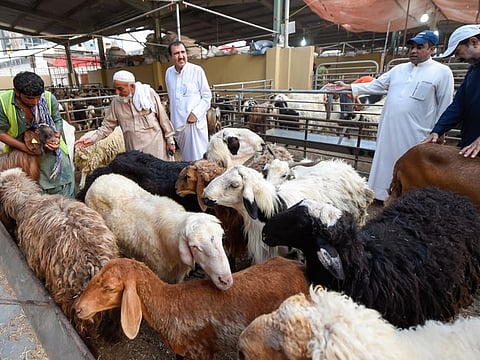Off the cuff: Techie makes online sheep market for Eid
Just before Eid, sheep farmers have a busy time getting their animals to the cities

A friend sent me an Eid greeting and the picture had a sheep peering cautiously from behind a partially closed barn door, and asking whether Eid was over yet.
The picture caption was both poignant and funny and yet captured the essence of Eid Al Adha (Feast of Sacrifice).
For those of you who are not Muslims and do not know what the festival is about; it is celebrated to commemorate the steadfastness, the courage and unstinting devotion of Prophet Ebrahim (PBUH), who had been tested by God to sacrifice his son.
The Prophet single-mindedly went about his task, despite the devil trying (three times) to tempt him from his path, and till today a significant part of the Haj requires Muslims to stone the three symbolic stones that depict the devil. The gesture is to mark the rejection of evil.
As Prophet Ebrahim was on the verge of performing the sacrifice when his son was miraculously substituted by a sheep, and Muslims across the globe celebrate this test of God and Ebrahim’s obedience, by sacrificing cattle.
Sheep in a Cadillac
Every year since then, just before Eid, sheep farmers have a busy time getting their animals to the cities. Huge pens are set up just on the outskirts of the cities and people travel to the sheep markets and take back their animals in various modes of transport.
In my first year in Saudi Arabia, I witnessed a sheep being pushed by hysterical teens into a sleek Cadillac at one of the bustling sheep markets just out of Jeddah city, and after a few minutes of struggle, the animal looked at me through the back seat window of the vehicle as it drove off in style.
Last year, Twitterati posted a video on the social media platform of a sheep holding on for dear life to a man riding a motorcycle through one of the the busy cities of Pakistan. Somebody had shot the video from a car tailing this extraordinary scene.
Also Read: Why some men don’t do household chores
Also Read: Having your own ‘Rahul Bose moment’
Also Read: How a multicultural society works
On a closer look, you could see the sheep (that had a nonchalant expression on its face) had its front legs tied and the rope slipped through the rider’s neck so that the animal did not fall off.
Here in Bengaluru, south India, the sheep pens are set up right within the city limits, behind the Bangalore Palace walls and you can see people haggling over prices or taking a sheep away in an autorickshaw (Tuk-Tuk). The Bannur variety of sheep is popular here (named after town of Bannur where the sheep are bred), but prices have gone up ranging between 12,000 rupees (Dh620) to 50,000 rupees (Dh2,600) because of the heavy rains, and rise in transportation costs.
In Hyderabad, Telangana state, a techie has set up a company and has made the “Bakra (sheep) app” where you can buy the animal online. It also offers to perform the sacrifice on your behalf. A sheep weighing between 11 to 14kg is selling for 10,999 rupees (Dh570) , according to ‘oneindia’ website.
While a significant population in India celebrates various festivals, from Diwali (Festival of Light), Christmas (Festival to commemorate the birth of Jesus) or Holi (Festival of Colour), Eid Al Adha or Karwa Chouth (Festival where Indian women pray for the long life of their husbands), many people on social media have their own viewpoints about the festivals.
Some believe Diwali creates pollution because of burning firecrackers or that Christmas has become very commercial.
Others believe that eating meat is harmful, not only for your health (because it increases harmful cholesterol in the body) and that animal breeding for human consumption is also detrimental to the environment.
Mahmood Saberi is a storyteller and blogger based in Bengaluru, India. Twitter: @mahmood_saberi


